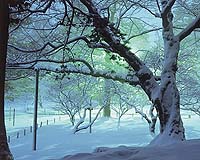 |
Paris (AFP) Oct 29, 2010 From its chocolate factory in the French Alps, Stephane Bonnat's family has been nurturing ties with cocoa farmers around the world for over a century, and together they are now driving a green revolution. Long dismissed by cocoa-loving gourmands as poor in texture and flavour, organic chocolate has broken into the luxury end of the market, promoted by master chocolatiers like Bonnat who have made it an "ethical choice". Bonnat decided to go organic 17 years ago, after taking over the family chocolate business in the Alpine town of Voiron. For him this meant building on its decades-old ties with growers around the world, starting in Mexico. "Back then they wanted to sell me their cocoa three euros a kilo. I offered them nine!" the chocolatier told AFP art the giant Salon du Chocolat trade fair in Paris this week. "Today they make a good living, they visit the Salon in Paris, get to see the finished product," said Bonnat, whose firm -- one of Europe's oldest -- was a pioneer of high-quality organic chocolate. Likewise, Bonnat says the 35 cocoa suppliers, from Peru to Venezuela, which supply his factory with some 220 tonnes of beans per year have benefited from the shift to high-end organic. Two of its growers in Brazil were awarded the 2009 Best Cocoa award, handed out each year at the Salon du Chocolat. Fully 80 percent of the world's cocoa plantations are thought to be de facto organic, run by farmers who cannot afford chemical fertilisers or pesticides, Bonnat told AFP. But only a tiny fraction of that output is certified organic, since few can cover the cost of a complex formal labelling process. "Cocoa beans that are certified organic account for just 20 percent of world production -- and less than two percent of the chocolate sold around the world is labelled organic," said Bonnat. Meanwhile most of the world's chocolate production is in the hands of a global industry for which, Bonnat says, quality is not a priority. "The paradox is that cocoa producer countries are not the ones that make the chocolate," he said. Parisian chocolatier Jean-Paul Hevin, who buys organic cocoa directly from producers in Haiti, started sourcing ethically a decade ago in a bid to "defend the sector" from industrial excesses. The choice comes at a price -- adding 20 percent to his production costs -- but he does not tack this onto the retail price for his chocolate, which sells for 3.90 euros (5.3 dollars) a bar. "I wanted to do something for Haiti, cutting out middlemen to provide growers with a better wage. I believe in 'art de vivre', in quality. And quality always depends on the grower," he told AFP. Hevin, whose stand at the Salon du Chocolat has the feel of a jewelry or luxury perfume display case, likens the "latest cru from Papua New Guinea" to a "truly great wine." The chocolatier recently opened a luxury hot chocolate bar in the French capital, offering punters such intriguing delicacies as chocolate with oysters, carrots or a chili-banana mix. "Organic or not organic," said Philippe Laurent, head of sales at the chocolatier Michel Cluizel, "a great tasting chocolate always depends both on the quality of the bean and on the craftsmanship. Excellence requires making the cocoa paste without artificial flavours or soy lecithin -- used as an emulsifier in most industrial chocolate -- and relying only on natural vanilla pods and cane sugar. Like Bonnat and Cluizel, Francois Pralus is one of five French luxury chocolatiers who tranform the cocoa beans themselves, sourced from South America or Indonesia. He too has built up a relationship with growers in Madagascar -- where he owns a small plantation -- and in Venezuela which produces the Chuao cocoa -- "an exceptional vintage from exceptional soil." In Venezuela, the 20 tonnes of cocoa produced a year for Pralus helped rebuild the local school, while his planters in Madagascar earn 65 euros (90 dollars) per month, almost three times the average wage of 25 euros. "Organic chocolate doesn't taste better per se," says Pralus. "It requires a heavy financial commitment, the admin and checks are cumbersome. But it's also a philosophical gesture, a lifestyle choice that we make every day."
Share This Article With Planet Earth
Related Links Farming Today - Suppliers and Technology
 Japan looks to ancient village wisdom to save biodiversity
Japan looks to ancient village wisdom to save biodiversityToyooka, Japan (AFP) Oct 27, 2010 Four decades ago the oriental white stork became extinct in Japan, the victim of rapid industrialisation and modern farm practices and heavy pesticide use that destroyed its habitat. Today, the graceful migratory bird soars again over restored wetlands around the small town of Toyooka in western Japan, now a showcase for an ambitious conservation effort called the Satoyama Initiative. As ... read more |
|
| The content herein, unless otherwise known to be public domain, are Copyright 1995-2010 - SpaceDaily. AFP and UPI Wire Stories are copyright Agence France-Presse and United Press International. ESA Portal Reports are copyright European Space Agency. All NASA sourced material is public domain. Additional copyrights may apply in whole or part to other bona fide parties. Advertising does not imply endorsement,agreement or approval of any opinions, statements or information provided by SpaceDaily on any Web page published or hosted by SpaceDaily. Privacy Statement |